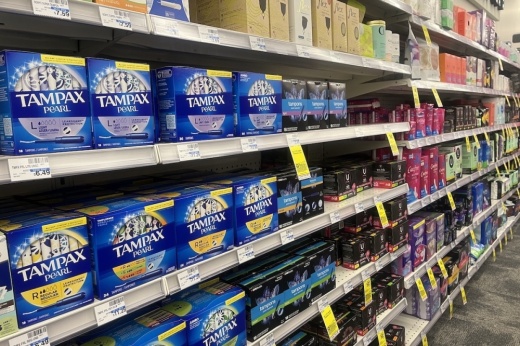Rep. Donna Howard, D-Austin, filed House Bill 300 in February and has filed similar legislation every session since 2017, originally focusing on addressing “period poverty” by eliminating sales tax on tampons. Now her proposed bill includes more infant and maternity care supplies, removing some of the financial burden on families who have to purchase the items regularly.
“I think a lot of us just assumed that those products were tax exempt,” Howard said. “Recognition of that was rather astounding to many of us, [and it] raised my consciousness of the issue.”
If HB 300 is signed into law, diapers, bottles, baby wipes, tampons, pads, menstrual cups, maternity clothes and breast pumps would be tax exempt. Additionally, Rep. Bryan Slaton, R-Greenville, added an amendment to remove sales tax on adult diapers.
“This legislation has other products, but the period products I continue to advocate for as a way to remove a discriminatory tax that just applies to over half the population,” Howard said. “It’s not something that’s a luxury. It’s a medical necessity.”
Howard said she was initially inspired to file the legislation in 2017 after speaking with a group of students from the Texas Menstrual Equity Coalition, who for years have been fighting to make period products more financially accessible statewide. Many young people from low-income backgrounds weren’t coming to school for several days each month because they didn’t have access to menstrual care items, Howard said.
Holly McDaniel, executive director of the Austin Diaper Bank, said removing sales taxes on menstrual and maternity supplies would allow families to allocate money to other monthly costs like groceries, gas and clothes for their kids. In terms of diapers specifically, McDaniel said families could save anywhere from $85 to $100 over the course of a year.
“The families living in poverty or below the federal poverty line are really looking at every penny that goes out the door,” McDaniel said. “So every penny they save from the sales tax on diapers and period supplies can go immediately into something else that they desperately need.”
Austin Diaper Bank, an organization that provides diapers and wipes to Central Texas families who struggle to afford the items, has worked closely with Howard by spreading awareness about the need for improved access to diapers and other maternity supplies. McDaniel said many families forget that diapers aren’t covered by any federal or state programs, so they can’t be purchased with food stamps or other forms of government assistance.
“The reactions we get are that [people] are shocked that they’re not already tax free—that it’s common sense legislation,” McDaniel said.
Lesley Varghese, the president of Safe Alliance, said making medical necessities more accessible would also increase economic security for lower-income families, which plays a big role in violence prevention. Safe Alliance serves survivors of sexual assault and domestic violence in Austin by providing shelter, education and a variety of support services.
“When you think about what keeps somebody from often leaving a violent situation is they are concerned about leaving and reducing their source of income,” Varghese said. “If it’s going from a dual-income household to a single owner, it can be very daunting, especially because of the ability to purchase basic necessities.”
HB 300 was approved by the Texas House of Representatives in March and was referred to the Senate Finance Committee, which heard testimony May 8. Gov. Greg Abbott and House Speaker Dade Phelan have both expressed support for the proposal.
“There’s a lot more that needs to be done; ... we haven’t achieved health equity here,” Howard said. “But when you’re talking about people who are having to live paycheck to paycheck ... the cumulative impact of savings on sales taxes can make a difference.”





